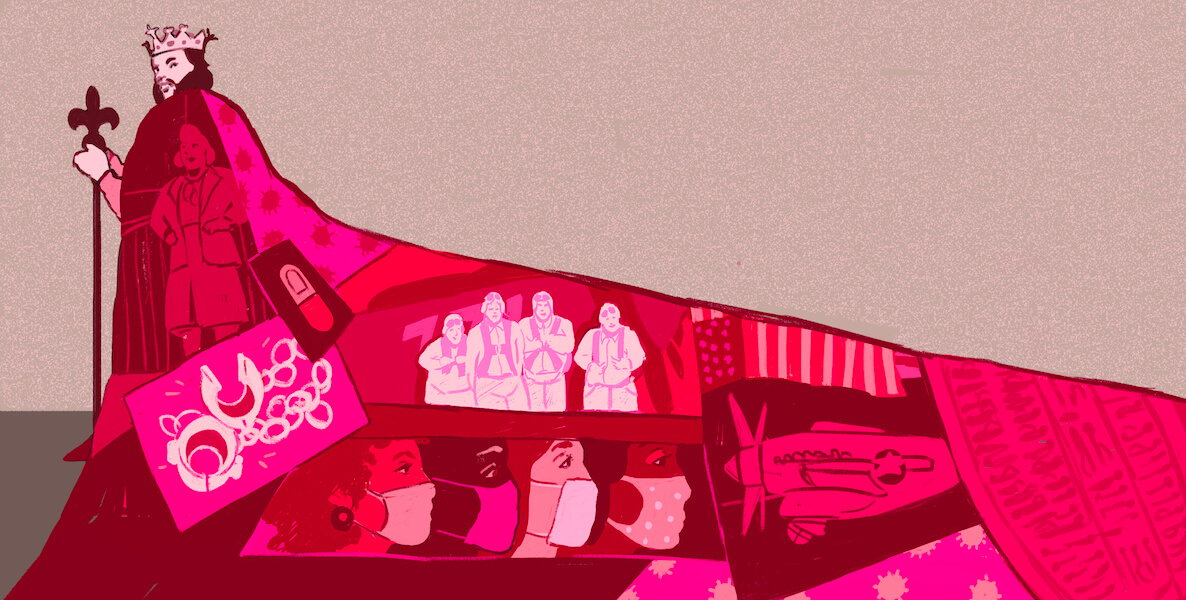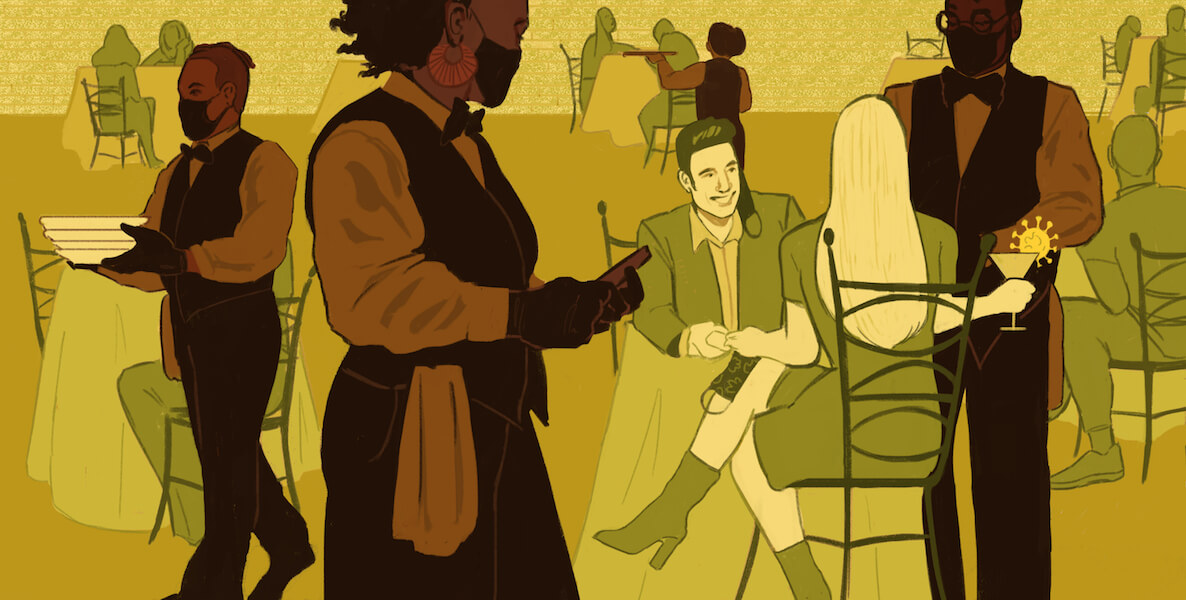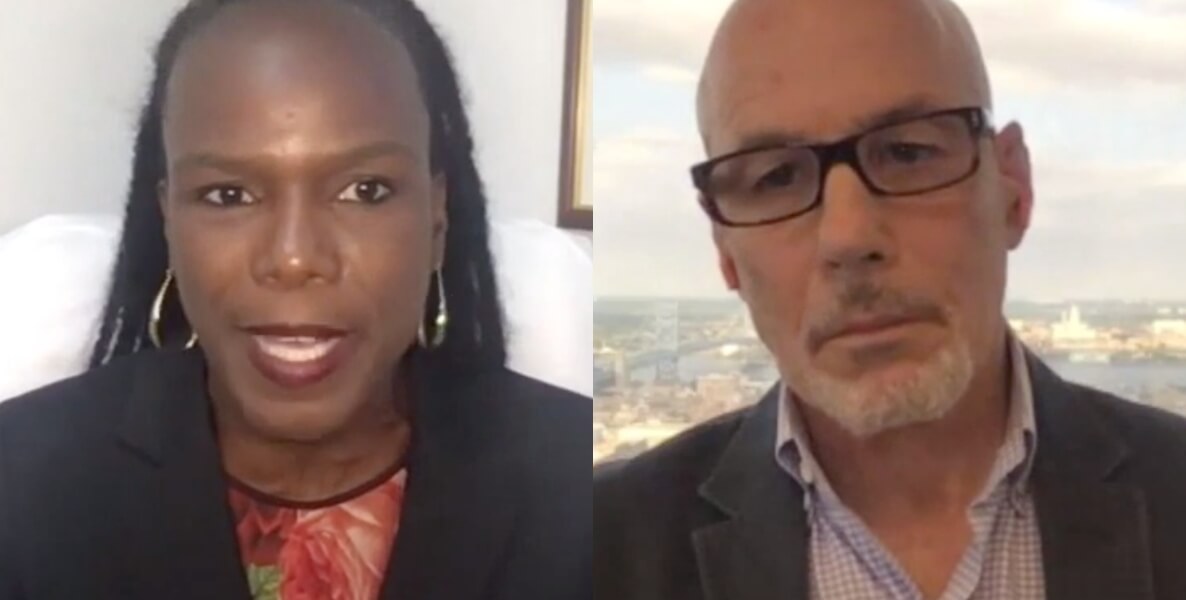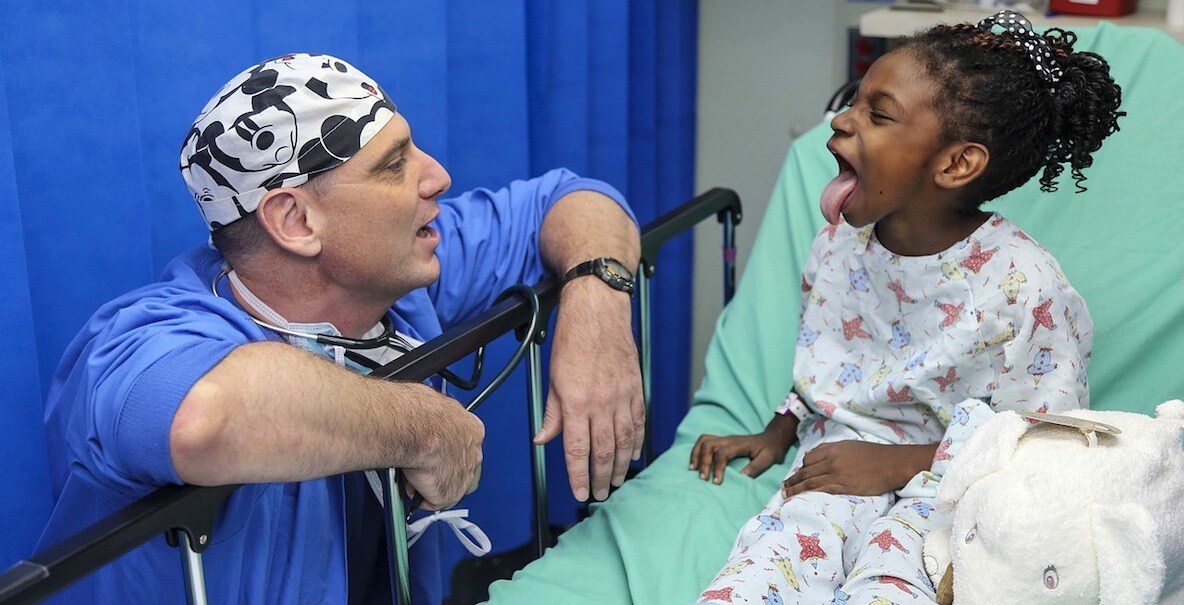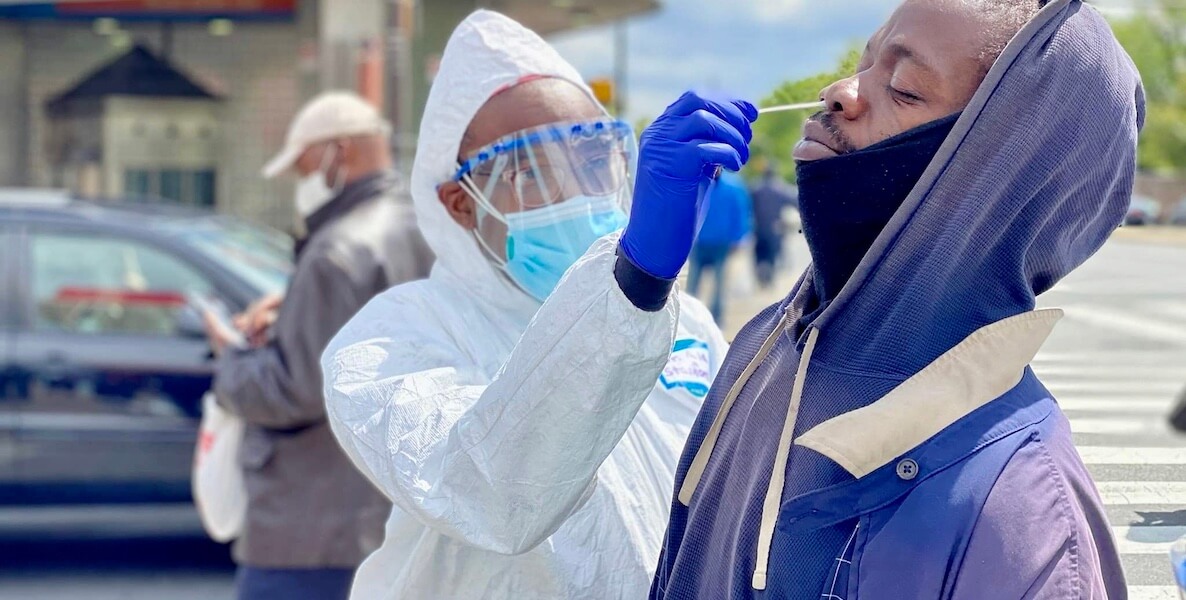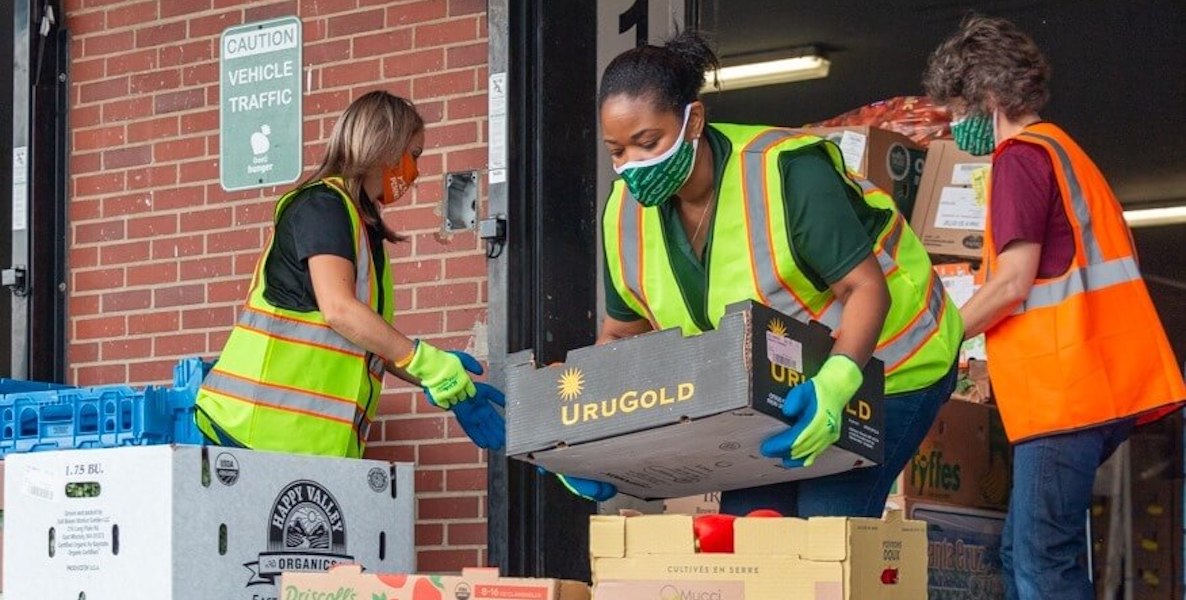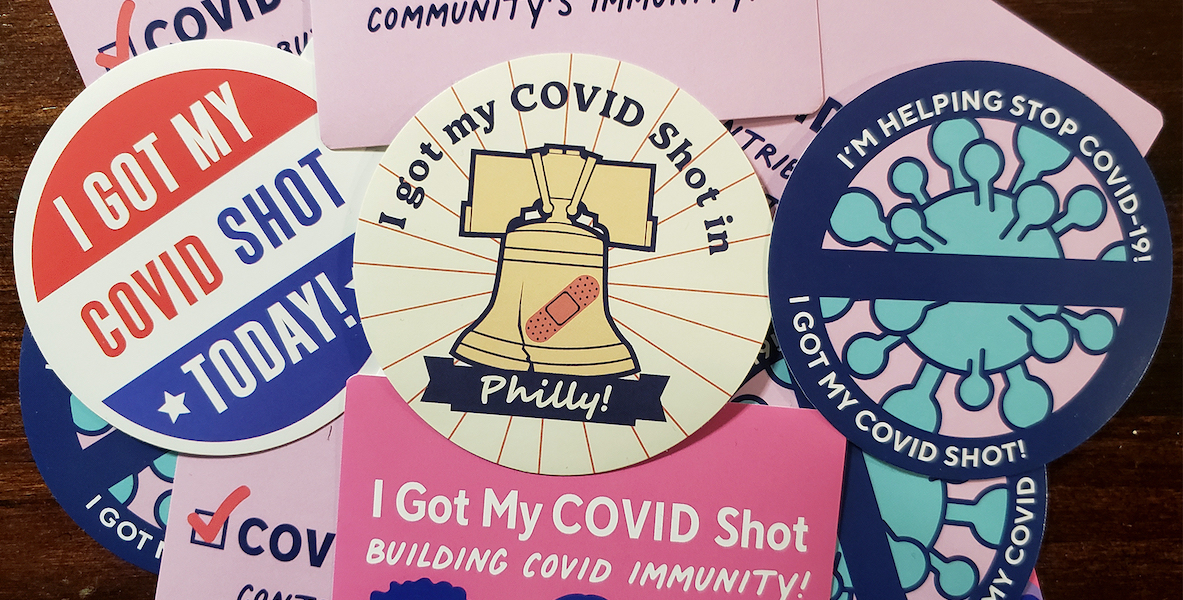![]() They’re impossible to miss.
They’re impossible to miss.
From Facebook to the front page, from cable news to your book club’s text chain, images of healthcare workers getting vaccinated seem to be everywhere.
Ever since the vaccine rollout began in the U.S. on December 14, recipients—the majority of whom, for now, work for healthcare systems—have both felt compelled to and, in some cases, been explicitly encouraged to, share the news. And with good reason: Experts in health communications have known for years that peer endorsement is a powerful force—and it’s just one tool of many that will be crucial to increasing people’s willingness to get vaccinated, and their follow-through in actually doing so.
Mari and Ed Siegel, married emergency room physicians at Temple University Hospital, proudly posted pics of themselves getting vaccinated on December 16. Mari is part of a grassroots Facebook group of nearly 30,000 physician-moms who’d started planning a coordinated effort to post pics for weeks leading up to the arrival of the vaccine.
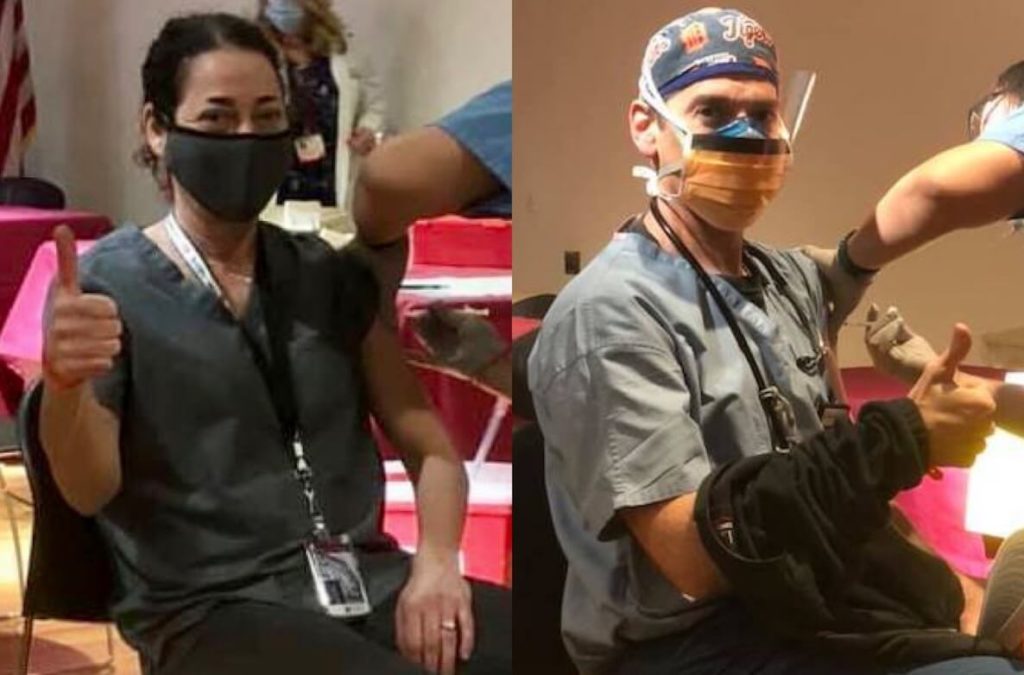
“It was an effort to publicize that the vaccine is safe; we’re not afraid of it; it’s good science; it’s good technology; and this is the only way out,” she says. “This is the only way to return to any sense of normalcy, not just for physicians, but for all the people who don’t have jobs, whose businesses are closed, whose kids can’t go to school.”
![]() Mari’s Facebook post sparked a conversation with two vaccine-hesitant nurses whom Siegel was able to convince to get vaccinated. “I nudged them with facts about the science, and about the safety, and by debunking these myths that are put out there by anti-vaxxers and other people who don’t know better,” she says.
Mari’s Facebook post sparked a conversation with two vaccine-hesitant nurses whom Siegel was able to convince to get vaccinated. “I nudged them with facts about the science, and about the safety, and by debunking these myths that are put out there by anti-vaxxers and other people who don’t know better,” she says.
For example, she’s sure to emphasize that, even with a vaccine, she’ll continue wearing a mask and social distancing until we reach herd immunity. “We’re not doing this and then going out and changing our behavior. We’re doing this because we want to be part of the solution. Everybody needs to be part of the solution or we’ll never get out of this.”
And Siegel is sure to drive home the only side effects she’s experienced: “Immediate relief, an urge to dance, the inability to hold back tears, optimism, hope for the future, tremendous gratitude to the scientists who’ve been working on this ….and minimal, minimal, minimal arm soreness for maybe an hour or so,” Mari says.
Growing confidence
Already, public willingness to get vaccinated has risen since the vaccine went from a hypothetical to a tangible option. A recent New York Times article reported that “the portion of people saying they are now likely or certain to take the vaccine has grown from about 50 percent this summer to more than 60 percent, and in one poll 73 percent.”
Still, there are those who are skeptical, and understandably so. African-Americans, for example, who have been and continue to be mistreated, exploited, and endangered by the U.S. health system and government, are among the subgroups of people taking a wait-and-see approach.
But experts caution that there is also a lot of over-estimation by the media of vaccine reluctance among Black Americans: A recent Kaiser Family Foundation survey showed that 1 in 5 Black Americans plan to get a vaccine as soon as possible, and only 15 percent say “definitely not.”
At a December 18 webinar held by the National Academies of Sciences, Engineering and Medicine to address the challenge of increasing “vaccine confidence,” Alison M. Buttenheim, Associate Professor of Nursing and Health Policy at Penn’s School of Nursing, cautioned against making inaccurate assumptions about communities of color.
“I heard a really strong warning from a community activist in Black health activism [in Philadelphia] who said you’re going to actually undermine trust if you go whole hog on equitable coverage of this vaccine, because our response is going to be What about equitable cancer care and what about equitable maternal mortality statistics? Why is this issue suddenly where you’re super keen to make sure everything’s equitable?” she said.
That misrepresentation is not the only misinformation circulating in the universe, where anti-vaxxers are quick to exploit social media. (To be clear, there is a distinction between those who are anti-vaccine, and those who are vaccine-hesitant; the latter can be swayed.) Fortunately for Philly, where data from 2017 to 2019 shows that childhood vaccination rates in our city were the highest in the nation, the anti-vaxxer community has never had much of a stronghold here, says James Garrow, spokesperson for Philadelphia Department of Public Health (PDPH). And experts agree that public health resources should not be wasted on efforts to convince those anti-vaxxers.
Instead, resources should be focused on convincing those who are on the fence, and those who say they want a vaccine but may not actually follow-through on getting one. And to win those people over, we’d be wise to heed the wisdom of some masterminds in our own backyard.
Marketing tactics tailor-made for Philly
Take Jim Walls and Brendan Quinn, partners at Philly-based branding agency Truth & Consequences. You might know them as the guys who helped create the epic Eagles hype videos (with their previous agency, 160over90).
Talking to them via Zoom one morning, it’s readily apparent that, more than anything, these soft spoken, modern day admen are nothing if not social anthropologists, devotees of human psychology. And perhaps nowhere is that more apparent than in the way they see the road to increasing vaccine confidence and compliance:
“Philadelphians have laser-sharp bullshit detectors,” Quinn says, “and we can’t rely on something that feels inauthentic, artificial, or handed from a government entity.”
![]() They single out the anti-littering “Don’t Mess With Texas” campaign and the anti-smoking “truth” messages as two of the most successful health campaigns in modern history, and suggest some incentives that could work here: A Wonka-esque ticket that could land you a new car! A $100,000 pot that stands to benefit you more if others don’t get vaccinated! Private access to Disney World for a day!—and competitive ideas (are you Team Pfizer or Team Moderna?), as well as scarcity marketing tactics (think: Hunger Games).
They single out the anti-littering “Don’t Mess With Texas” campaign and the anti-smoking “truth” messages as two of the most successful health campaigns in modern history, and suggest some incentives that could work here: A Wonka-esque ticket that could land you a new car! A $100,000 pot that stands to benefit you more if others don’t get vaccinated! Private access to Disney World for a day!—and competitive ideas (are you Team Pfizer or Team Moderna?), as well as scarcity marketing tactics (think: Hunger Games).
Whatever messaging goes out in our region, they maintain, it has to feel like it’s real, and from the people. It cannot fall back on tired cliches.
What Quinn considers the most obvious campaign of all: the new Citywide Special. Get your shot (the vaccine)—then get a shot (or a beer), at the bar.
In other words, says Walls: “It can’t be Rocky wearing a mask, getting his shot.”
Quinn and Wall’s instincts align with those of highfalutin experts, including Buttenheim and Robert C. Hornik, professor of Communication and Health Policy at Penn’s Annenberg School for Communication, who was also on the esteemed panel of presenters at the December 18 webinar. Buttenheim, Hornik, and their colleagues from around the country emphasized the importance of building trust and battling misinformation.
Buttenheim, for example, suggested the value in creating a public-facing dashboard, where people could see in real-time how many doses have made it to Philly, how many have been distributed, how they’ve been distributed, whether there are racial or socioeconomic disparities in who’s been covered, and so on.
“I think having that real-time, transparent information from our public health agencies can really contribute to trust in the process,” Buttenheim said during the webinar.
That will require an investment, which could come from government and other community partners (think: IBX, Penn, Jefferson).
Garrow, of PDPH, says that funding for vaccination campaigns is expected to come from federal relief funds; for now, the fact that demand is exceeding supply is buying PDPH time to secure funding and plot outreach, which will center on exactly the kinds of campaigns other experts encourage: working with hyper-local influencers to assuage concerns, remove barriers, and increase compliance, as with this video of Dr. Ala Stanford, founder of the Black Doctors COVID-19 Consortium.
It wouldn’t hurt to make the process fun
Katy Milkman, co-director with Angela Duckworth of Wharton’s Behavior Change for Good Initiative, also believes in the critical role of “social proof.”
In a recent article for The Economist, she explained that people look to their peers for cues about how to behave, and that it’s important for health authorities to emphasize the support for vaccinations instead of focusing on naysayers.
“The more visible we can make it when people get vaccinated, the better,” she wrote. “Seeing widespread adoption of a vaccine will calm many people’s fears about safety. And if members of low-risk groups see their friends clamoring to get vaccinated, they are likely to queue up, too.”
When she thinks about the challenge of getting Americans vaccinated, Milkman sees it as two-fold: First, everyone (except for the minority of anti-vaxxers, she too agrees) needs to be motivated to want to get vaccinated. Then, they need to actually follow up on their intention to do so.
That “action-intention” gap—or, as Milkman says, the space between “I mean to do it, but life gets in the way”—is at the heart of much of her research, and many studies by her and her peers in the field continue to show the effectiveness of simple, low-cost “nudges” to get people to do things that are good for them, whether it’s registering to vote, hitting the gym, or saving for college.
What won’t work, according to Walls: Rocky wearing a mask, getting his shot.
And Milkman says that those on the fence could be persuaded by mandates and rewards. “Requiring health-care workers and students to get vaccinated would follow precedent, and not only protect them but build community-vaccination norms, too.”
As for paying people to get inoculated, well, it may incentivize some people but, she cautions, it could also backfire: the more people are paid to do something, the more they infer it entails substantial risks, she says. That approach would require further testing—which, given the need to vaccinate as many people as possible as quickly as the vaccine can be produced, could take too long.
![]() All of the experts—Buttenheim, Hornik, Quinn, Walls, Milkman, and so on—agree that widespread adoption will require bipartisan buy-in from high-profile validators: Dr. Anthony Fauci, of course, and even Donald Trump, since 85 percent of vaccine-hesitant Republicans, according to Kaiser Family Foundation, consider the outgoing president a “trusted source.”
All of the experts—Buttenheim, Hornik, Quinn, Walls, Milkman, and so on—agree that widespread adoption will require bipartisan buy-in from high-profile validators: Dr. Anthony Fauci, of course, and even Donald Trump, since 85 percent of vaccine-hesitant Republicans, according to Kaiser Family Foundation, consider the outgoing president a “trusted source.”
That insight about bipartisanship underlies some of the quirkier ideas Quinn and Walls have half-jokingly tossed around: having President Trump and President-Elect Joe Biden get their vaccines on the dais immediately before the inauguration (since then, Biden did get and publicize his); Dak Prescott and Carson Wentz (er, Jalen Hurts?); Pat’s and Geno’s; Claude Giroux and Sidney Crosby!
Milkman says it’s important to make sure the vaccine is as hassle-free as possible, free and quick. And, she adds, it wouldn’t hurt to make the process fun. Which just so happens to dovetail with another idea from Quinn and Walls, what Quinn considers the most obvious campaign of all: the new Citywide Special.
Get your shot (the vaccine)—then get a shot (or a beer), at the bar.
And that just might be the most brilliant intersection of healthcare policy and economy recovery of all.



